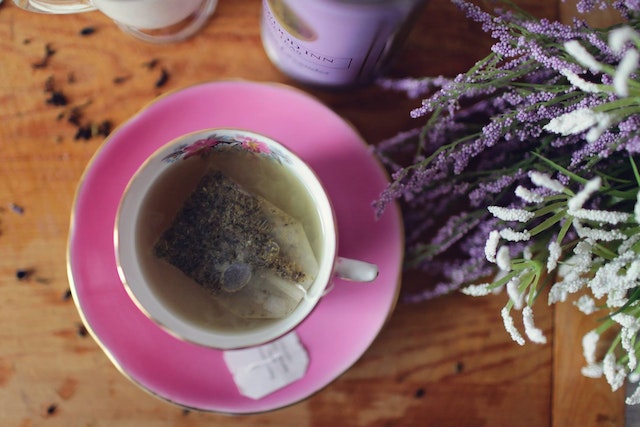Hey there! This post may contain affiliate links. As an Amazon Associate, I earn a teensy commission from qualifying purchases when you buy through these links (at no additional cost to you). For more info, please check the full disclaimer.
Lavender is known for its floral and sweet scent, which soothes the nerves and improves mood. Add this calming ingredient to warm tea and you have the perfect little pick-me-up blend before bedtime. The remarkable health benefits of lavender tea for women range from its sedative effects to improving skin health and period cramps.
Here you’ll find how to prepare lavender tea and the health benefits of purple tea for your overall wellbeing.
What is Lavender Tea?
Like other herbal teas, lavender tea isn’t technically a ‘tea’ as it’s not prepared from tea leaves. Instead, it is an infusion of dried lavender flowers brewed in hot water.
Many different types of lavender plants are found in Europe, India, and certain parts of Africa. The benefits of lavender tea combined with its distinct color and fragrance contributed to the surge in its popularity across many different cultures.
How to Prepare Lavender Tea?
You can make lavender tea by adding a teabag in hot water. Or prepare your own batch of tea according to your taste with freshly purchased ingredients.
Ingredients:
For one cup of lavender tea, you need the following ingredients:
- A few dried/fresh lavender flowers
- One cup of water
- 1 tsp of honey or sugar(optional)
Recipe
You can brew a hot cup of lavender tea in just a few minutes by following this recipe:
- Boil a cup and water and add 2-3 buds or dried flowers
- Cover the pot and let the water steep for 4-5 minutes
- Pour the tea into a clean cup
- Add sugar, honey, or any other sweetener according to your preference
Additional Instructions
- Add ½ lemon to improve the taste of lavender tea
- Brew for 10 mins if you prefer a stronger flavor of lavender
Read More: Health Benefits of Chamomile Tea for Women
When is the Best Time to Drink Lavender Tea?
You can enjoy the health benefits of lavender tea as a mid-day snack, evening refreshment, or a part of your weekly self-care routine. But if you are looking to gain specific benefits from purple tea, you may need to determine the ideal time for this beverage.

- Before Bed
If you experience insomnia, the calming properties of lavender tea make it an ideal beverage before bed. Sipping the comfy, warm tea as you nestle in bed is the perfect way to drift into a peaceful dream.
- Mid-day Snack
Lavender tea can help declutter your brain during a stressful day at work. It can alleviate stress and keep you energized for the rest of the day.
- Stressful Situations
If you are facing stress at work or home, you can make yourself a cup of lavender tea. Its soothing effect relieves stress and boosts mood, improving your ability to tackle difficult situations.
Read More: Benefits of Peppermint Tea for Women
What are Some of the Health Benefits of Lavender Tea?
From its effect on emotional health to its ability to improve period cramps, there is a myriad of health benefits of lavender tea for women.
Let’s delve into these and more advantages of consuming this herbal infusion:
1. Pre-Menstrual Syndrome (PMS)
Pre-Menstrual Syndrome is a combination of various symptoms experienced by women days before the start of menstruation.
One of the benefits of lavender tea is its ability to decrease the intensity of emotional changes before and during periods. The scent of lavender tea can significantly improve low mood swings and feelings of depression in women.
2. Period Cramps
As the period begins, it brings with itself a range of painful symptoms like cramps and bloating. Nothing feels better than a cup of hot and sweet-scented lavender tea as you rest in the comfort of your bed.
Other than relaxing your cramping body, the long list of benefits of lavender tea also includes relieving those dreaded menstrual cramps. Some studies have suggested that long-term consumption of lavender can reduce the severity of period cramps in women.
Read More: Foods to Ease Period Cramps
3. Skin Health
Incorporating lavender tea into your skincare routine can go a long way. It is a source of natural antioxidants that prevents early aging in women and blemishes while promoting a healthy glow to the skin.
Some other skin benefits of lavender tea include its ability to soothe irritated skin and fight inflammatory conditions like acne and eczema common in teenage girls.
4. Anxiety and Depression
The benefits of lavender tea also include its use as an alternative treatment method for anxiety and depression. It is inexpensive, accessible, and safe to consume by the general population.
A study validated its use as an anxiolytic as it observed noticeable differences in the scores of anxiety and depression after consuming lavender tea twice a day.

5. Post Natal Benefits
Many mothers can attest that the postpartum period is the most challenging time in motherhood. Your body is healing from giving birth, hormonal levels are fluctuating, and you have a little human to care for.
Some of the benefits of lavender tea include decreased fatigue in new mothers. If you consume a cup of lavender tea in the early days after birth, you might develop a much closer bond with your little ones.
In addition, lavender tea has been a saving grace for many new mothers as it improved emotional lows and depression scores after giving birth.
Read More: Symptoms of Postpartum Anxiety
6. Quality of Sleep
Sipping a cup of lavender tea before bed can ease stress and calm your tired brain to lull you to sleep. Linalol, a component of lavender, is a mild sedative that not only increases your sleep time but also improves deep sleep.
Many women, especially nursing mothers, look for alternative treatments to improve the quality of their sleep. Due to the relaxing benefits of lavender tea, this warm beverage can be soothing before bed so you can wake up refreshed and rejuvenated.
Read More: Best Herbal Teas for Sleep
7. Weight Loss
If you are on the journey towards a healthy lifestyle, incorporating lavender might be a good idea. While it’s not a magic solution on its own, the benefits of lavender tea include a faster metabolic rate which helps burn more calories.
Lavender tea is also a great caffeine-free and caloric-friendly alternative to sugary beverages. It also curbs the urge to binge eat, as the consumption of lavender tea is associated with lower stress levels, a primary trigger of emotional eating.
Hence, it can be an excellent way to meet your weight loss goals with exercise and diet control.
8. Hair Loss
Hair loss is a common issue in women. Women may experience hair loss from diabetes or nutritional deficiencies such as low iron.
The benefits of lavender tea for hair health are due to its anti-inflammatory constituents that prevent scalp irritation, promote blood circulation in the scalp and encourage healthier growth of hair.
A good hair routine is also not complete without the incorporation of lavender tea. Regular use of lavender tea as a hair rinse strengthens the hair follicles, reduces hair breakage, and promotes overall hair health.
9. Immune System
One of the benefits of lavender tea is its ability to support the immune system. Lavender contains vitamin C, magnesium, and calcium that help the body fight off all kinds of infections.
Many women drink lavender tea as a cure for flu and sore throat. The warm liquid soothes the hurting throat and strengthens the body against bacterial attack.
Is it Safe to Use Lavender Tea in Pregnancy?
The incredible benefits of lavender tea make it the perfect beverage of choice for many pregnant women, especially during the sleepless nights of the third trimester.

The Food and Drug Administration (FDA) has listed lavender tea as GRAS (Generally Recognized as Safe). So occasional consumption of lavender tea does not pose any negative consequences to health. Drinking a cup of lavender tea before labor calms your nerves and alleviates nausea.
According to the National Institute of Health, little is known about the potential side effects or benefits of purple tea on fetal development. At the start of your pregnancy, consult your gynecologist regarding the quantity and time of consuming lavender tea.
Read More: Best Herbal Teas to Boost Fertility
What are the Side Effects of Lavender Tea?
While there are many benefits of lavender tea, it should be noted that the oral use of lavender lacks proper scientific research. Drink lavender tea in moderation and keep a close eye on your symptoms, particularly if you are consuming it for the first time.
Many people are allergic to lavender tea, and its consumption leads to skin allergies. In severe cases, it can cause anaphylactic shock resulting in breathing difficulties, so if you are allergic to any herb, try to avoid the use of lavender tea.
Consuming large quantities of lavender tea increases appetite and causes stomach pain, nausea, and digestive issues.
Lavender tea has estrogen-like properties and is not suitable for women with symptoms of breast and ovarian cancer.
While lavender tea has the remarkable ability to improve the symptoms of depression, studies have also shown that it interacts with anti-depressant medications.
If taken with anti-depressants like Zoloft, it can cause serotonin toxicity leading to shivering, diarrhea, and even hospitalization in extreme cases.
The Bottomline
Lavender tea is a wonderful blend of gentle flavors with tremendous health benefits. Whether you drink it early in the morning or late at night, its calming effect can help you relax and soothe your worries.
The benefits of lavender tea cover a broad spectrum, from upgrading your beauty routine to helping new mothers get much-needed help. It boosts mood, alleviates anxiety and depression, and reduces period cramps.
However, there is a lack of clinical research observing the safety of lavender tea. If you are pregnant or nursing, you should consult your gynecologist before adding this herbal tea to your diet.
Overall, adding lavender tea to your daily routine can be an excellent way to take care of yourself. A bad day or period cramps — tea really does make everything better!
References:
- https://pubmed.ncbi.nlm.nih.gov/30000925/
- https://pubmed.ncbi.nlm.nih.gov/36773055/
- https://pubmed.ncbi.nlm.nih.gov/35462027/
- https://pubmed.ncbi.nlm.nih.gov/31243622/








